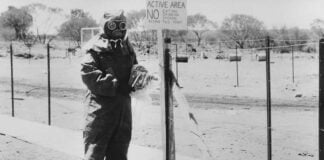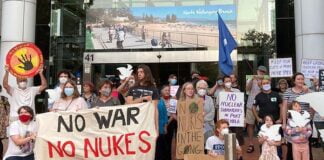US air strikes on Syria have been delayed to allow President Bashar Al-Assad the chance to surrender his stockpiles of chemical weapons. But US President Barack Obama is still insisting on the need to bomb Syria if the talks break down, telling the US military to remain “in a position to respond”.

Just as John Howard supported the invasion of Iraq, Tony Abbott has pledged Australian government support to the US over Syria. Abbott told Insiders that, “all Australian governments instinctively want to support our friends and allies, and our greatest ally is obviously the United States”.
Obama moved quickly to blame the horrific chemical weapons attack that killed hundreds of civilians squarely on Bashar Al-Assad’s regime, and is continuing to make the case for bombing. In early September he delivered his first prime time address to the nation in two years to make the case for war.
But the US suffered a severe setback when the British parliament, the US’s key ally in Iraq and Afghanistan, refused to support military action against Syria. Its vote against bombing came as a blow to the war-mongering British Tory PM David Cameron, who had already called for intervention.
The opposition in Britain is a product of the strength of the anti-war movement there and its continued campaigning over the past decade. Up to three million demonstrated in London against the Iraq War in February 2003.
This setback forced Obama to say he would go to Congress to get authorisation for military action, even though this is not required under US law.
Obama’s newfound caution is a product of deep divisions in the US ruling class about taking action, as well as a groundswell of public opposition.
Up to 70 per cent of Americans are opposed to bombing, according to opinion polls. Inside Congress and the US military, there are also fears of being drawn into a longer war, and many are desperate to avoid a repeat of the disastrous wars in Iraq and Afghanistan. With its economy still not recovered from the economic crisis that began in 2008, there are also doubts the US government can afford another protracted war.
Obama’s retreat from unilateral bombing has exposed the limits of US power.
Not a humanitarian war
Western intervention in Syria would only make the situation worse and result in even more civilian deaths. The Assad regime’s brutal crackdown on the revolutionary movement that began in 2011 has already cost 100,000 lives.
The wars in Iraq and Afghanistan produced only misery and trauma. Over a million Iraqis were killed and the US ignited vicious sectarian tensions that are still raging in its efforts to turn Iraqis against each other and maintain its control.
The West has no humanitarian motives in attacking Syria. The US now cries crocodile tears about the use of chemical weapons. Yet it has crossed this “red line” itself many times. It carpet bombed Vietnam with Agent Orange, supplied Saddam Hussein with gas to attack the Kurds in 1988 and used white phosphorus in Fallujah in Iraq.
The US hopes to further its own interests by imposing a settlement in Syria where either a more pliant ruler is installed or the country is divided. It is engaged in a power play with the other world powers including Russia, which has supplied Assad with heavy weapons, as well as Iran and the Lebanese military resistance organisation, Hezbollah, which also supports the Syrian regime.
There is still a legitimate popular revolution taking place in Syria that deserves our support. It faces deep dangers from both the Assad regime and Western intervention. But the success of the popular revolutions of the Arab Spring that began in 2011, in Egypt, Tunisia and Syria hold the only real hope for liberation and genuine democracy across the region. Western bombing can only set back their struggle.
The US threat to bomb Syria comes at the same time as massive joint US-Australia military exercises in Darwin. Syrian asylum seekers arriving by boat are being locked up in detention centres and threatened with being removed to PNG or Nauru.
We must unequivocally oppose any attack on Syria, and any cooperation by Australia with such an attack.





